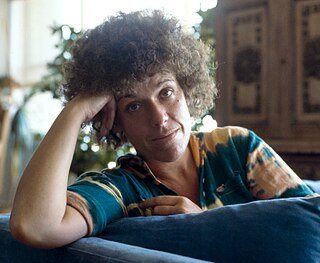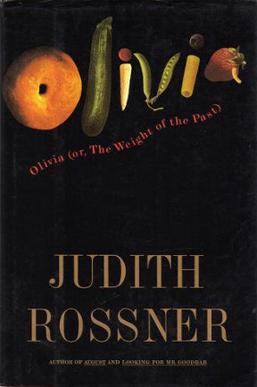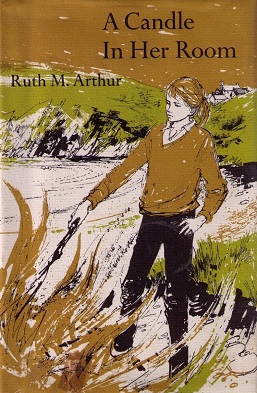
Lucy Larcom was an American teacher, poet, and author. She was one of the first teachers at Wheaton Female Seminary in Norton, Massachusetts, teaching there from 1854 to 1862. During that time, she co-founded Rushlight Literary Magazine, a submission-based student literary magazine which is still published. From 1865 to 1873, she was the editor of the Boston-based Our Young Folks, which merged with St. Nicholas Magazine in 1874. In 1889, Larcom published one of the best-known accounts of New England childhood of her time, A New England Girlhood, commonly used as a reference in studying antebellum American childhood; the autobiographical text covers the early years of her life in Beverly Farms and Lowell, Massachusetts.

Judith Rossner was an American novelist, best known for her acclaimed best sellers Looking for Mr. Goodbar (1975) and August (1983).

The Witch of Blackbird Pond is a children's novel by American author Elizabeth George Speare, published in 1958. The story takes place in late 17th-century New England. It won the Newbery Medal in 1959.

Up a Road Slowly is a 1966 coming-of-age novel by American writer Irene Hunt, which won the Newbery Medal for excellence in American children's literature. This book is about a young child named Julie who grows from 7 to 17 years old with her aunt Cordelia and uncle Haskell in the country.

Ramona Forever is a humorous children's novel written by Beverly Cleary. The seventh book in the Ramona Quimby series, continues the story of Ramona, her older sister, Beezus, and their family. They are finally old enough to stay home together, and they work hard to get along. Mrs. Quimby is expecting a baby and Aunt Bea gets engaged in a book that sees Ramona coping with growing up. It was originally published in 1984.

The Lowell mill girls were young female workers who came to work in textile mills in Lowell, Massachusetts during the Industrial Revolution in the United States. The workers initially recruited by the corporations were daughters of New England farmers, typically between the ages of 15 and 35. By 1840, at the height of the Textile Revolution, the Lowell textile mills had recruited over 8,000 workers, with women making up nearly three-quarters of the mill workforce.

Marguerite Audoux was a French novelist.

Emmeline is an opera in two acts composed by American Tobias Picker with a libretto by J. D. McClatchy. Picker's first opera, it was commissioned by the Santa Fe Opera company and premiered in 1996. Based on Judith Rossner's novel of the same name, Emmeline is an American retelling of the Oedipus myth from the mother’s viewpoint.

Olivia is the penultimate novel by Judith Rossner, author of the critically acclaimed best sellers Looking for Mr. Goodbar and August. Published in 1994 by Crown, Olivia examines "a mother-daughter conflict set in the world of gastronomy." ,
Susan Fromberg Schaeffer was an American novelist and poet who was a Professor of English at Brooklyn College for more than thirty years. She won numerous national writing awards and contributed book reviews for The New York Times.

Double Identity is a 2005 young adult novel by Margaret Peterson Haddix.

Dead Beautiful is a young adult urban fantasy novel by American author Yvonne Woon. The story follows Renée Winters, an orphan who is sent to a mysterious Gottfried academy. While enrolled, Renée discovers a series of enigmas, most surrounding her school, her boyfriend, and eventually herself. The novel was released to critical acclaim in 2010, with a sequel, Life Eternal, following in 2012.

Harriet Jane Hanson Robinson worked as a bobbin doffer in a Massachusetts cotton mill and was involved in a turnout, became a poet and author, and played an important role in the women's suffrage movement in the United States.
Betsey Guppy Chamberlain (1797–1886) was a textile mill worker who wrote sketches and poetry that were published in The Lowell Offering. Her co-worker, Harriet Hanson Robinson claimed that Chamberlain "had inherited Indian blood" and some sources claim she was Native American; however, there is little identifiable evidence to support the claim. Some of her writing in the Lowell Offering protests the treatment of Native people by the U.S. government.
The New England Offering was a collection of journal entries that were written by female mill workers in New England mills. Many of the women who were contributing to the magazine were working in mills in Lowell, Massachusetts. The “Lowell Offering” was a collection of narratives where women shared their works in a intellectual and cultural publication. The contributors took great pride in the magazine. The “Lowell Offering” gained a great deal amount of popularity. It was read by famous writers such as Charles Dickens, Anthony Trollope, and George Sand. The “Lowell Offering” lost momentum after the opinions of the writers moved towards areas that mill owners did not agree with. The “New England Offering” was established after controversy with the Lowell Offering erupted and the editors Harriet Farley and Harriott F. Curtis had to discontinue the “Lowell Offering” and start a new magazine. The magazine's first issue appeared in September 1847, and Farley ended publication with the March 1850 issue.
Abba Goddard was a 19th-century New England woman best known for her work as an editor and author as well as for her role as a nurse during the American Civil War.

A Candle in Her Room is a 1966 children's book written by Ruth M. Arthur, illustrated by Margery Gill and published by Atheneum Books. The book - set in Pembrokeshire, Wales - explores the effect of a bewitched doll on multiple generations of young women.
Harriot F. Curtis was an American writer and journalist.
Emeline Bachelder Gurney (1816–1897) was a woman from Fayette, Maine, who was shunned by her family and community. Emeline gained notoriety after death, with her life story inspiring a documentary, then a book and a play.

Sybella Gurney was a housing reformer and leader of the co-partnership and cooperative housing movement, who 'made important and largely unrecognized contributions to British community design theory and practice'.














